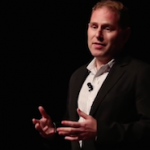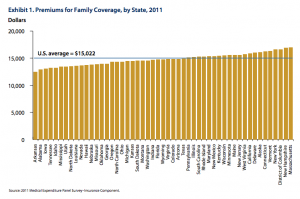Both parties are being disingenuous about Medicare reform. So let me be the first to open Pandora’s box and reveal three unpleasant truths.
First, health care spending is growing at twice the rate of growth of our income — clearly an unsustainable and undesirable spending path.
Second, any plan to reduce the growth rate of federal spending on health care without doing something about health care spending as a whole will necessarily shift costs — to the elderly, to the poor, to state governments, and to anybody other than the federal government.
Both parties are being disingenuous about Medicare reform. So let me be the first to open Pandora’s box and reveal three unpleasant truths.
First, health care spending is growing at twice the rate of growth of our income — clearly an unsustainable and undesirable spending path.
Second, any plan to reduce the growth rate of federal spending on health care without doing something about health care spending as a whole will necessarily shift costs — to the elderly, to the poor, to state governments, and to anybody other than the federal government.
Third, neither party is offering a serious plan to control health care spending as a whole.
Let’s start with President Obama, since his plan is already law. The administration calls it the Patient Protection and Affordable Care Act (PPACA). Other people call it ObamaCare. Whatever you call it, if you are confused about what it means, that’s understandable.
So tired of the straight line, and everywhere you turn
There’s vultures and thieves at your back
The storm keeps on twisting, you keep on building the lies
That you make up for all that you lack
The numbers you see in newspapers are almost always produced by the Congressional Budget Office (CBO), the bean-counting agency of Congress. These forecasts show a dramatic slowing of Medicare spending — about in line with the recommendations of the President’s debt commission and with such independent reform proposals as the one made by Rep. Paul Ryan (R-WI) and former CBO director Alice Rivlin.
If you are elderly or disabled, however, pay attention to a more ominous document — the Medicare Trustees report, released last summer. Unlike the CBO’s pronouncements, this report is an executive branch document that reflects the administration’s view of its own health reform. (Three cabinet secretaries — labor, health and human services, and treasury — are Medicare trustees.)
According to the Medicare Trustees report, ObamaCare will cut the rate of growth of Medicare spending in half and allow it to grow no faster than our national income. The Office of the Medicare Actuaries has released a separate document, explaining what this means:
- By the end of this decade, the fees Medicare pays to doctors will be lower than what Medicaid pays. Seniors will become less desirable as patients than welfare mothers.
- Also by the end of the decade, one in seven hospitals will be forced to leave the Medicare system.
In the decades that follow, the consequences continue to get worse and worse through time.
Bottom line: access to care is going to become increasingly difficult for the elderly and the disabled. That problem will be compounded when health reform insures 32 million additional people in just three years, without doing anything to create more doctors.
If all this is news to you, that’s understandable. The Obama administration has done nothing to publicize the Medicare actuaries’ warnings. But it has spent millions of our tax dollars on Andy Griffith television commercials, trying to convince seniors they have gained, not lost, as a result of health reform.
Senior voters were not fooled, however. In the last election, they abandoned Democrats in droves and voted for the GOP. Coming into this year, Republicans were in the catbird’s seat. Whatever Medicare reforms they called for would not be as bad as what the Obama administration had already planned.
Prudence might have dictated a cautious approach for Republicans — remembering the adage never to get between your opponent’s gun and his foot. Instead, a new Paul Ryan plan recently passed by the House of Representatives follows the ObamaCare cuts for the next 10 years and then calls for more severe cuts in the decades that follow.
For Ryan’s plan to have any chance to become reality it must be coupled with two additional items: (1) comprehensive health reform, slowing spending for everybody and (2) a way for people to save tax-free during their working years so they will be less dependent on government during their retirement.
I’ll write more about this in the future.







